Clotnine 600IU Injection contains active components such as factor IX. In some cases, individuals with hemophilia A (caused by a deficiency of factor VIII) may develop inhibitors (antibodies) against factor VIII, making standard treatment less effective. In such situations, it may be considered as an alternative. It can be used before, during, and after surgery to prevent excessive bleeding. Some people with hemophilia B may receive it as a preventive measure to maintain a certain level of this in their bloodstream, reducing the risk of spontaneous bleeding episodes, particularly in joints and muscles. It may be administered following traumatic injuries or accidents to prevent or control bleeding. In rare cases, it may be considered for treating other bleeding disorders or conditions that involve a deficiency, such as acquired hemophilia.
If a person has a known allergy or hypersensitivity to Clotnine 600IU Injection or any components of this product, it is a contraindication to its use. It is inappropriate for individuals with DIC, a complex bleeding disorder characterized by abnormal clotting and bleeding. People with severe liver disease may not respond well to it, and the risks and benefits should be carefully weighed. While it is commonly used in pediatric patients with hemophilia B, the dosage and administration should be carefully adjusted based on age and weight, and the treatment should be closely monitored. Clotnine 600IU Injection replacement therapy can be safe and effective for older adults with hemophilia B. However, dosing and treatment plans may need to be adjusted based on individual health and medical history.
- Treatment of hemophilia B
- Prophylactic treatment
- Management of bleeding episodes
- Surgical procedures
- Trauma and injuries
- Alternative treatment for hemophilia A with inhibitors
- Other bleeding disorders
- Pediatric hemophilia B
Therapeutic Effects of Clotnine 600iu Injection
Pregnancy
The use of Clotnine 600IU Injection therapy during pregnancy should be discussed with a healthcare provider. The safety and potential risks to the developing fetus should be carefully considered, and treatment options should be weighed.
Breast Feeding
The safety of Clotnine 600IU Injection therapy during breastfeeding should be discussed with a healthcare provider. Considerations should include the impact on the nursing infant and the treatment's potential risks and benefits.
Lungs
If you have a lung problem, consult a healthcare provider before taking Clotnine 600IU Injection.
Liver
Individuals with severe liver disease should consult their healthcare provider before using Clotnine 600IU Injection.
Alcohol
Excessive alcohol consumption can lead to side effects, so it is not safe to consume alcohol if you are using Clotnine 600IU Injection.
Driving
Individuals on Clotnine 600IU Injection therapy need to be aware of their own limitations and consult with their healthcare provider regarding driving safety.
Serious
- Allergic reactions
- Development of inhibitors
- Thrombosis (blood clots)
- Hepatitis transmission
- Liver complications
Common
- Localized reactions
The frequency of Clotnine 600IU Injection replacement therapy depends on the severity of hemophilia B and the treatment plan developed by healthcare providers. Some individuals may require regular prophylactic treatment, while others only need it when experiencing bleeding episodes.
While Clotnine 600IU Injection replacement therapy is generally safe and well-tolerated, there can be risks, including allergic reactions, inhibitor development, and thrombosis (blood clot formation). Patients should discuss potential risks with their healthcare providers.
Individuals on Clotnine 600IU Injection therapy should contact their healthcare provider or seek immediate medical attention if a bleeding emergency occurs. In some cases, they may be trained to administer Clotnine 600IU Injection at home for quick response to bleeding episodes.
Some individuals with hemophilia B are trained to self-administer Clotnine 600IU Injection at home. This can provide convenience and rapid access to treatment when needed, especially for prophylactic regimens.
There are usually no specific dietary restrictions while on Clotnine 600IU Injection therapy. However, maintaining a balanced diet and staying hydrated can support overall health and well-being for individuals with hemophilia B.
With proper management and treatment, individuals with hemophilia B can participate in sports and physical activities. They should work closely with their healthcare providers to develop a safe exercise regimen and take precautions to prevent injuries.
Molecule name: Factor IX | Therapeutic class: Hemostatic Agent |
Pharmacological class: Coagulation Factor - Antihemorrhagic | Indications: 1. Treatment of hemophilia B 2. Prophylactic treatment 3. Management of bleeding episodes 4. Surgical procedures 5. Trauma and injuries 6.Alternative treatment for hemophilia A with inhibitors 7.Other bleeding disorders 8. Pediatric hemophilia B |






-200x200.jpg)
